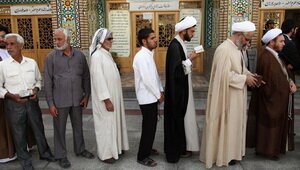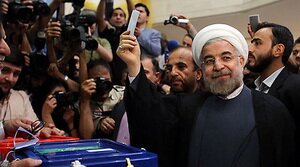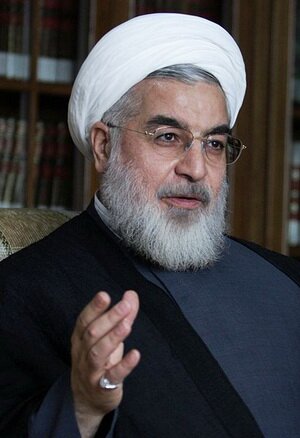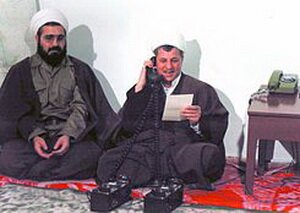
On the 21st of May, 2013 the Expediency Council of the Islamic Republic of Iran approved the final list of eight candidates for the Presidency.
In an effort to make the election as conflict-free as possible and in order to eliminate the possibility of selecting an "inconvenient President", the Supervisory Board approved the candidates absolutely loyal to the Supreme Leader. In particular, to participate in the elections were not allowed a former Iranian President Ali Akbar Hashemi Rafsanjani, who is quite popular among the Reformers, and the Head of the Administration of President Mahmoud Ahmadinejad, his close friend and relative Esfandiar Rahim Mashaei.
Two of the let to the election withdrew their candidacies:
On the 10th of June - the former Head of the Parliament, Gholam Ali Haddad-Adel.
On the 11th of Junbe – the Former First Vice President of Iran, Mohammad Reza Aref, who withdrew his candidacy in favor of Hassan Rouhani, representing the Reformist wing.
On the 14th of June, 2013 in the Islamic Republic of Iran took place the 11th Presidential election, in which the 7th President of the country was elected.
 According to preliminary results, promulgated by the Interior Ministry Headquarters, in the election by a large margin from the other candidates is leading ex-Secretary of the Supreme National Security Council, Hassan Rouhani, representing interests of Moderate and Reformist circles of Iran.
According to preliminary results, promulgated by the Interior Ministry Headquarters, in the election by a large margin from the other candidates is leading ex-Secretary of the Supreme National Security Council, Hassan Rouhani, representing interests of Moderate and Reformist circles of Iran.
Rouhani is gaining about 51.24% of the vote, followed by a wide margin is the current Mayor of Tehran, Mohammad Baqer Qalibaf, with about 16.6%, rounding out the top three, is Saeed Jalili, protégé of the Spiritual Leader Ali Khamenei, with approximately 13.1%.
Total number of those who came to the polls is about 50 million people. The turnout was about 75%.
So far only about 8.3 million ballots have been processed.
If the gap between the candidates continues in such proportions (which are very likely) then in any case a leader will remain Hassan Rouhani, even if it comes to a second round of voting. That is, in case if he gets 50%+ votes.
Portrait of the Leader: Hassan Rouhani
 |
|
Hassan Rouhani
ISNA |
He was born on the 12th of November, 1948 in Sorhe, Semnan province. Primary religious education he got in the Seminary of the city of Semnan in 1960, in 1961 he moved to Qom to continue religious education, has the title of Shiite Modzhtahid (a man who should be imitated).
In 1969 he entered the Law faculty of Tehran University and graduated in 1972, having defended his Bachelor's Degree in Law. Rouhani then entered the Caledonian University (Glasgow), where he studied Public Law. In the course of study at the University in turn he defends his Master's Degree and Doctorate in Law.
In 1965 he began his political activities in the group of Ayatollah A. Homeyni. Had been persecuted, and repeatedly arrested by Shah's regime. An active participant in the Islamic Revolution in Iran.
A member of the Assembly of Experts since 1999, a member of the Expediency Council since 1991, Secretary of the Supreme National Security Council from 1989 to 2005, Head of the Center for Strategic Studies since 1992.
He was repeatedly elected to the Majlis of Iran, a total of five convocations (20 years of parliamentary activity!): Head of the Committee on Defence (1st and 2nd convocation), head of the Committee for Foreign Affairs, Deputy Speaker of the Majlis (4 and 5 convocation).
During the Iran-Iraq war, he held a number of important positions in the Armed Forces of Iran:
- 1982-1988 - member of the Supreme Defence Council;
- 1986-1988 - Member of the Supreme Council of support to the war, and led the Executive Committee;
- 1983-1985 - Deputy Commander of the Armed Forces of Iran;
- 1985-1988 - Head of the Operational Center "Hatem al-Anbiya of the Armed Forces of IRI ';
- 1986-1991 - Commander of the Air Defense;
- 1988-1989 - Deputy Commander in Chief of the Armed Forces of Iran. Has a state award.
- 1989-1997 - Advisor on Security issues to President Hashemi Rafsanjani, and from 2000 to 2005 - to President Khatami.
He has a number of high government awards.
In Iran, Hassan Rouhani is called "Sheikh of diplomacy."
From October 2003 to October 2007 he headed the group in the negotiations on the Iranian nuclear program.
Presidential candidate from the political-religious organization "Combatant Clergy Association”.
Adheres to a centrist position, is considered a flexible politician, trying to find a compromise with the West. Enjoys the support of the higher clergy. Promises, if elected, to develop a "Charter of Civil Liberties." Prior to the elections, said: "My goal is restoration of the economy, securing moral and interaction with the rest of the world. I want to create a government of wisdom and hope. "
Rouhani is a very intelligent and wise person with great experience in negotiations with the West. He was responsible for the dialogue on the nuclear program and led a discussion on the supply of Iranian gas to the European market. In particular, he proposed a package solution: in exchange for ending the nuclear program, the West had to provide Iran with security guarantees and a long-term contract for gas supplies. But with all this, Rouhani is devoid of charisma and levers of influence on the government, and his chances of winning directly dependent on how actively he will be supported by Ali Akbar Hashemi Rafsanjani.
 |
| Hashemi Rafsanjani and his Deputy, Hassan Rouhani during their leading operations «Karbala-5" during the Iran-Iraq war, February 8, 1987 |
Rouhani also supports the continuation of the negotiations on the Iranian nuclear program and is sure that in this matter he can rely on European leaders, because only they can prevent aggression from the United States. In a similar way that is by increasing contradictions between Brussels and Washington he intends to seek the lifting of international sanctions against Iran.
Talking about foreign policy in general, the candidate calls for "constructive cooperation" with the world, and that is how he is going to solve the existing problems in Iran and seek the development of his country.
In domestic policy, he advocates "poli-frontality" and believes that social unrest following the Presidential elections of 2009 was caused exactly by the fact that all the power in the state was concentrated in the hands of the front of the Conservatives.
Rouhani is positioning himself as a moderate, balanced politician that is credible, both in Iran and abroad.
Rouhani’s victory in the elections will mean a historic rejection of the eight years of Conservative rule, which led the country to international isolation and economic crisis.
It can be expected that Rouhani will hold a series of reforms in the social sphere, in the sphere of human rights and will begin the process of Constitutional changes in order to guarantee equality for women and ethnic minorities living in Iran.

